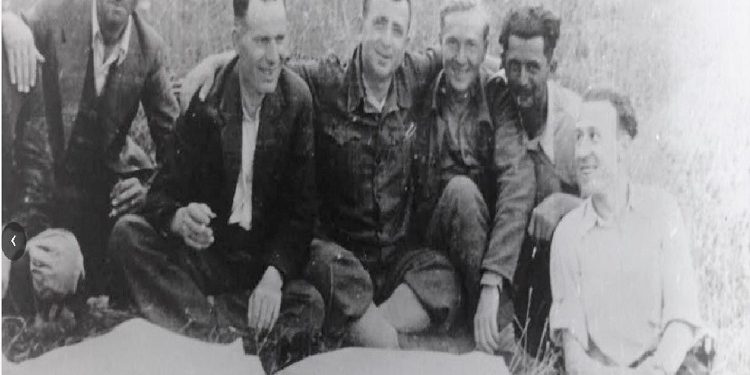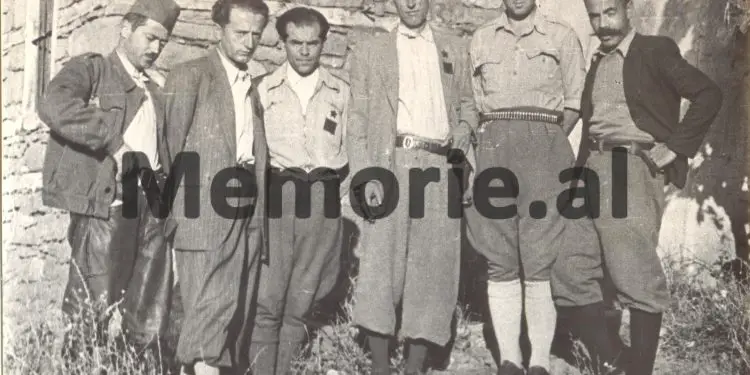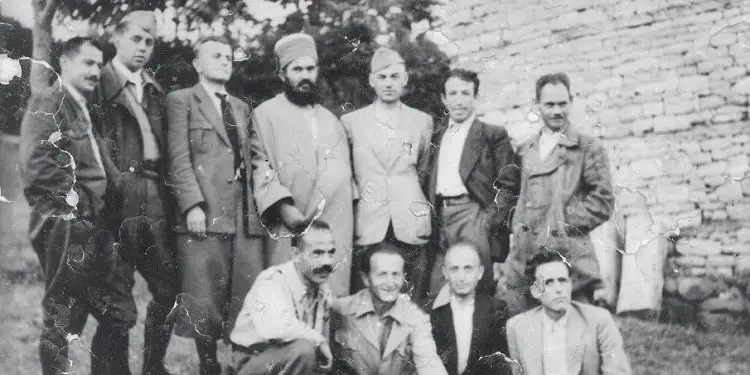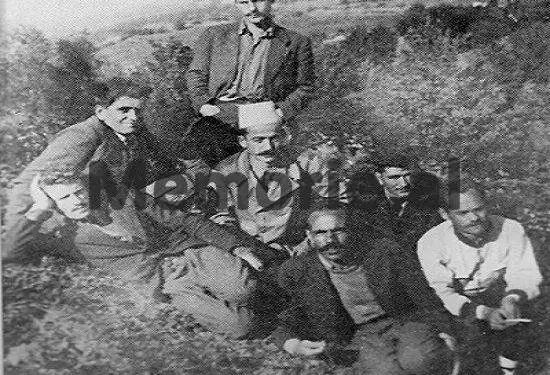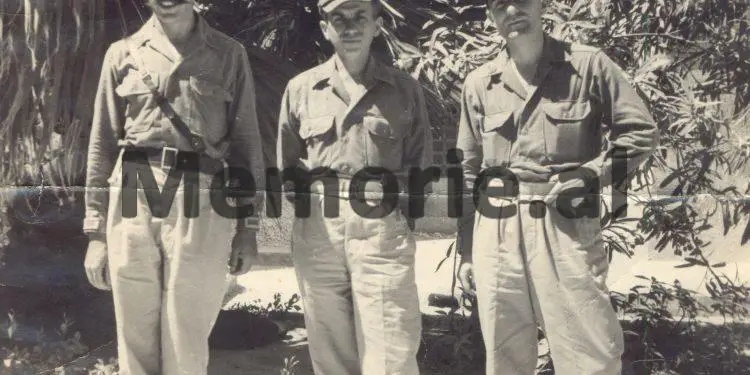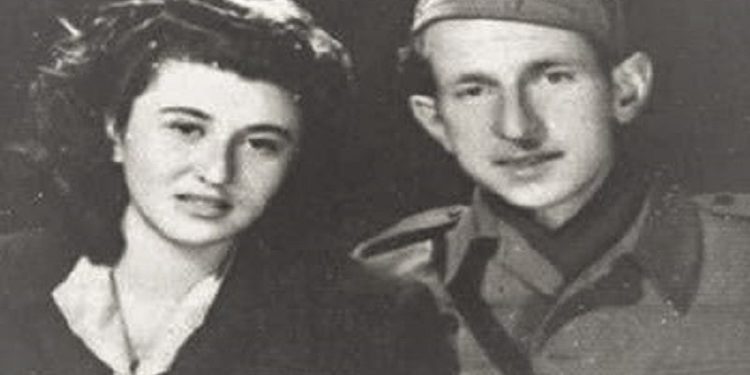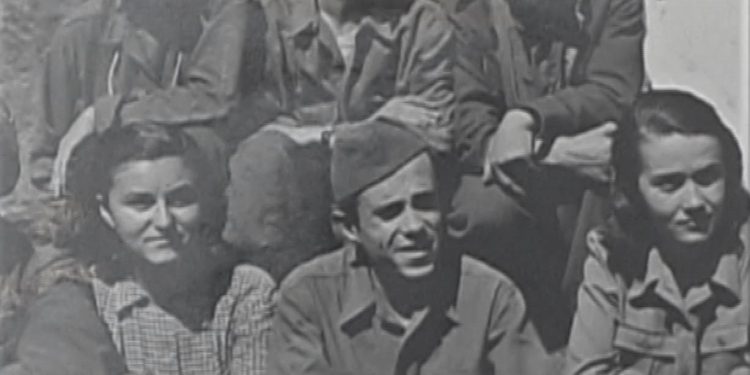By Gjergj Titani
The third part
Memorie.al / For the first time, we have been able to provide the witness account of many historical events. The conversation with Pandi Kristo, a senior figure of the Communist Party of Albania and the Albanian state, took place in Tirana, in the house of his son-in-law, Robert Vullkani, where he was forced to live, when he was released from exile, since the Albanian democratic state, never gave him a home. The regime, for which he fought, targeted him to liquidate Pandi Kristo, placing him in the group of Koçi Xoxes, convicted for “hostile activities”. For 42 years in a row, I would wander the prisons of the communist dictatorship and successive exiles, until communism was overthrown forever, at the beginning of the 90s. The interview was conducted in 1992 – 1993 and over the years, it was completed, according to the memories and family archive of Pandi’s daughter, Assembly Kristo (Vullkani), sister, veteran of the Anti-Fascist National Liberation War, his son-in-law, Robert Vullkani, and the memories of many contemporaries. Here is Pandi Kristo’s confession.
Continues from the previous issue
Mr. Pandi, what were your impressions of the organization and development of the country’s First Conference?
The year 1943 had entered, the war was taking on larger and larger proportions. From month to month, armed partisan and nationalist detachments were being formed. We, the communists, counted about 2,000-3,000 partisans and about 6,000-7,000 members of guerilla units and territorial squads and in the villages. In the Korça District, in addition to isolated battles and attacks on small military garrisons of the enemy, there were also battles for the liberation of the area of Voskopoja, Leskovik, Barmashi, Përmet and Këlcyra.
They were fighting for the creation of a large liberated area, under the direction of a temporary operative headquarters, where the commanders, Nexhip Vinçani and Gjin Marku, stood out. Precisely in these fights, there were wounded, and very few killed, among them Asim Zeneli, (“Hero of the People”). To conduct successful battles, with as few losses as possible, this was Nexhip Vinçani’s logical principle.
I remember that he and his commissar, Pëllumb Dishnica, never boasted about it. The two of them, after each combat activity, would report to the center: “The operation was carried out successfully. No one was killed, very few injured”. The combat activity of the partisan forces was increasing. In these conditions, the Albanian Communist Party was growing and expanding, not only in the main cities and populated centers, but also in the armed forces. Now, the NPSH had about 600-700 members, and their basic organizations should send 65-70 delegates and guests to the conference.
I remember that five papers were given; for organizational and political issues, the Anti-Fascist National Liberation War, the Army and for the military union of workers and peasants. In addition, several sub-reports were held, such as: “On the anti-fascist organization of Albanian women”, “on the communist youth”, “on the issues of the party’s finances”, etc. Finally, the First National Conference of the SNP would conduct the elections of the permanent Central Committee of the SNP. I want to say that no activity, apart from the one we are talking about, has been carried out with such party rules.
From the Korça District, which organized its meeting in the village of Polen, and its work was led by Dr. Ymer Dishnica, co-opted in the Central Committee of the SNP, six delegates and two guests were elected. I can never forget their names. So: Naxhije Dume, me, Petro Papi, Nesti Kerenxhi, Pëllumb Dishnica, Nexhip Vinçani and the guests, Miha Lako and Pilo Peristeri, we were the seven representatives of this District, and we left for the First National Conference of the NPSH, which was gathered from March 17-22, 1943, in Labinot of Elbasan.
What were some of the most controversial points of this large-scale conference, which took place a year and a half after the formation of the NPSH?
First, I want to point out a fact that is known to everyone. Our Party, at its founding meeting, did not elect a General Secretary, or even an Organizational Secretary, but allocated duties to the seven members of the provisional Central Committee. It would not be superfluous to mention that the tasks entrusted to Enver Hoxha were neither more nor less than simply keeping the protocol of the meeting and the tasks for collecting party quotas, as well as step-by-step adjutantship , and behind Miladin Popovic’s back. What is the most surprising and unacceptable, in the proceedings of this conference, is that when it was proceeded to proceed to the new elections of the permanent Central Committee, Enver Hoxha made a proposal that “surprised everyone”, because he proposed that Josif Broz Tito be the General Secretary of the NPSH.
As strange as this proposal seems, this is a fact, which sparked discussions among the delegates of the conference. The reaction was immediate and the friends in turn said: “What do you say, Enver?” What is this proposal you made?! We are not electing the General Secretary of the Yugoslav Communist Party, but we are electing the secretary of the Central Committee of the Albanian Communist Party”. Anyway, from the Albanian archival documents, but also from the official Yugoslav ones, which I had the opportunity to read recently, it appears that it was Miladin’s insistence and persistence to elect Enveri, General Secretary. Fatally, at this time, Koçi Xoxe was imprisoned in Tirana, so he was elected to the position of General Secretary of the KPSH, Enver Hoxha.
This selection was the most devastating mistake and this is where the usurpation that would later take place on the KPSH, founded as much as I could sacrifice, by the representatives of the Albanian working class began. As a result of the brutal interventions of Miladin Popovic and other representatives of the Yugoslav Communist Party, who called themselves all-powerful; the lack of experience, the pronounced and credulous complex of the leaders of this fragile working class, subservient to foreign representatives, this political thug and his lackeys, as the wise and courageous Sejfulla Meleshova later described them, managed to become powerful. Koçi Xoxe was elected Organizational Secretary of the Central Committee of the NPSH, although in absentia, for whom we can never say that he was elected as a result of someone’s support.
The reasons why Koçi was elected to this important function were that he, like no one else, organized and promoted the activity of the Communist Group of Korçë, provided special assistance for the establishment, organization and expansion of the NPSH, led a heroic struggle within jail. I have heard it said, that; Koçi Xoxe was an ignorant, uncultured tinker who knew nothing of the national and international communist movement, that he was arrogant and other lies like these.
I don’t want to be taxing anyway. Time will tell who Koçi Xoxe was, but I want to say briefly, three or four personal considerations about him. He was of working origin and a respected tinsmith or sheet metal worker, his father, Dhimitri, was respected by everyone both in Negovan and Follorin, as well as in Korça, Tirana, Berat, Vlora and others. Koçi was not ignorant, but as I heard, an excellent student and in the school records, there were no grades, except for the “excellent” setting.
He could not be ignorant when he came from a perfect family circle. His grandfather, together with Petro Nini Luaras, the patriot, the martyr of the national education of Colonia, ran the school of Negovan, supported, supported and were delegates of the two Congresses of Manastir. Koçi knew perfectly several foreign, regional and western languages, and for six or seven years in a row, together with a group of communists, they perfected the French language of professor Spiro Xega, whom, among the old members of the Communist Group of Korça, we had our man until recently.
The connections with Professor Xega and the district of Korça were maintained through the prominent activist and later martyr of the Anti-Fascist National Liberation War, our friend Gaqo Korroveshi, whom I was a very good friend of. Those who want to tarnish Koçi personally, with such epithets, either did not know his outstanding activity closely, have complexes with him, or carry the image of Enver Hoxha, for many reasons.
I want to testify that, before the First Conference of the country convened, we were informed by Blazho Jovanovic, that the Albanian Communist Party was recognized by the Yugoslav Communist Party and the Comintern, which would soon suspend its activity, according to the demands and insistence of Western anti-fascist leaders, mainly American President Roosevelt and British Prime Minister Churchill. At the First Conference of the country, the idea was thrown that soon, a closer meeting would be held, to elect the General Staff of the Albanian Anti-Fascist Army, which needed its centralized direction, because already, the army Partisan was passing from the stage of mass creation of partisan and territorial battalions to the stage of creation of brigades. We, in Korça, would have the honor of preparing the inauguration of the First Partisan Assault Brigade, which was founded on August 15, 1943, in Vithkuq of Korçë.
You were the commissioner of the headquarters of Korça District, can you tell us about the efforts that were made for the formation of the General Headquarters on July 10, 1943 and the influence it had in liberating the country?
From July 4-10, 1943, in Labinot, Elbasan, the Anti-Fascist National Liberation General Council met, which decided the formation of the General Staff of the Army. The necessity of creating the General Staff of the Army, so that the organization and direction of combat actions, the organization of major operations and the creation of partisan brigades, as a new phase of the Anti-Fascist National Liberation War, was required by the time and the new phase, in which the war had started.
The separation of the direction of the armed war from the political direction with two specialized staffs, such as; The General Staff of the Army and the Central Committee of the KPSH was again necessary, so that the direction of the armed struggle was done with its own specialized bodies, such as; General Command, General Headquarters, District and Zone Headquarters, Brigade Headquarters, and so on.
In the composition of the General Staff, in addition to the members of the Central Committee and the Political Bureau, there were other cadres with military inclinations and skills. As far as I remember, the General Staff consisted of 12 members, who were: Spiro Moisiu, Enver Hoxha, Myslim Peza, Haxhi Lleshi, Baba Faja (Mustafa Xhani), Dali Ndreu, Bedri Spahiu, Ramadan Çitaku, Abaz Kupi, Mustafa Gjinishi , Ymer Dishnica and Sejfulla Maleshova. The commander of this headquarters was the 40-year-old Spiro Moisiu, who came to this position with the baggage of a long and respected career, where not only the skills of military professionalism stood out, but also his personal dignity and patriotism. Enver Hoxha was elected Political Commissar of the Staff, who gave even greater authority to this specialized military body, being also the General Secretary of the NPSH.
I do not undertake and do not pretend to give a complete portrait of Enver Hoxha, in this field, because his complex personality, who ruled the Albanian political and state scene with an iron fist, cannot be given in an interview like this and with the notes that I have drawn from my experience. My thoughts are deeply the thoughts of a man and necessarily, they carry within themselves his subjectivism.
I have known Enver, since his early youth, and in many cases from what this man claims, for the Communist Group of Korça, prominent personalities of the Albanian Communist and Workers’ Movement, the establishment of the NPSH, major events of its history and the Anti-Fascist National Liberation War, various activities such as Plenums of the Central Committee, meetings of the Politburo, Conferences and important national meetings, I will try to be open and say my opinion, as an old communist and anti-fascist , as a member of the Central Committee and Bureau, and as a member of the Government.
This man, in many cases, wanted his work, interest and political situations to distort the truths, which I, who are talking together, cannot agree with him today. At the same time, I will calmly await the remarks and criticisms of my opponents, just as I will lovingly await the suggestions and opinions of my comrades in war and work.
Given the heterogeneous composition of the UNCL General Staff, were there alternative opinions and disagreements in making decisions?
Of course, yes. All the more so that the personal power of the various personalities of LANÇ had not yet crystallized. In the composition of the Headquarters, as can be seen from the names I mentioned, who belong to different beliefs and political wings, such as; Abaz Kupi was a representative of the armed forces of Legality, Haxhi Lleshi, Baba Faja, Myslim Peza and Mustafa Gjinishi, personalities with pronounced nationalist tendencies, such as Spiro Moisiu, Bedri Spahiu and Dali Ndreu, personalities with essentially military tendencies such as Sejfulla Maleshova, Ymer Dishnica, Ramadan Çitaku, including, as I said above, the presence of Enver Hoxha, Miladin Popovic’s pet, were personalities who came from the ranks of the intelligentsia. In these conditions, there was no way to express alternative opinions from this heterogeneous group, unlike the decisions of the Central Committee of the NPSH, or the troika Miladin, Enver, Dushan, when they decided a priori, without asking for the collegial opinion of the Headquarters general.
With this reasoning, the cooling off and subsequent departure of Abaz Kup, or the enmity of Myslim Peza with Enver Hoxha, after the murder of Mustafa Gjinishi, who was not only a friend of his family, and whom he considered as a son, but had spent together with him and Kajo Karafili, the difficult days of political emigration. After the formation of the General Staff, which became known throughout the country, by means of a proclamation, the phase of creating large tactical-operational units, brigades and then divisions, would come.
Returning once again to the events of that time, I honestly say that the General Staff, whose work was concentrated in the hands of three or four people, in addition to the well-known positive facts of the conduct of the war, is also responsible for many mistakes heavy. One of these mistakes is that of the enemy’s Winter Operation, where the fate of the war hung in the balance, as a result of the detachment of the General Staff from the direction of the main forces.
The direction of the fighting in the South of the country was taken over by the Operational Group of the General Staff, which included: Liri Gega, Haxhi Lleshi, Ramadan Çitaku, Koçi Xoxe, who headed this group. We cannot forget the help of the experienced managers, Nexhip Vinçani, Pëllumb Dishnica, Teki Kolaneci. Moreover, the military incompetence of Enver Hoxha and other members of the General Staff was not establishing contacts with the largest operational unit that the National Liberation Army had, until then, the First Assault Brigade, skillfully commanded by Mehmet Shehu and Tuk Jakova, who undertook a heroic incursion to save the General Staff. I am sorry to say that, depending on the political situation, Enveri has called this extraordinary action of the 1st Assault Brigade and Mehmet Shehu as his intentional betrayal! This case would surprise any person with cold, clear logic.
A few months after this event, the Korça District organized an anti-fascist demonstration and at the head of the demonstrators was your mother Polixeni Kristo, who fell heroically. Can you tell us something more about this event?
My mother became very close to us, her children. She was involved in war actions, along with her men, distributing communiques, medicines and other war materials. My mother and sister accompanied many different illegal friends who were sheltering in my house, such as: Miladin Popovici, Dushan Mugosha, Nako Spirun, Naxhije Dumen, Vasil Shanton, Misto Mamen, S.V. Tempo with Milica, his wife, Mihal Durin, Tuk Jakoven, Fiqret Shehu, Ramadan Çitaku, Pëllumb Dishnice, Llambi Dishnice, Pilo Peristeri, Fuat Babanin, Taqi Skendi, Kleopatra Maliq, Kasiani Paskali, Vasilika Boboshtic, and others.
Between the joy of the great victory, the capitulation of Fascist Italy, on September 8, 1943, I learned with great sadness that the mother was killed in the great demonstration of September 9, 1943. This demonstration took place in Korça, with an extraordinary participation., that very day, when Fascist Italy capitulated.
The district officer of the PKSH of Korça, called on the troops of the Italian division, deployed in Korça and in other cities of the district, to unite with the Albanian people, against the new invader, the German Nazis and their collaborators, who were also enemies of the Italian people. But the command of the division ordered to open inhumane fire against the unarmed people of Korça, right in the square in front of the “National Warrior” monument, in the center of the city, which was left with the blood of 59 killed and 93 wounded. mostly women.
This demonstration was one of the biggest and bloodiest in all of Albania, but surprisingly, over the years, it has been left in an unforgivable oblivion. In Albania, the forces of the IX Army of the Italian Army capitulated piecemeal and many of them, about 15,000 soldiers, non-commissioned officers and officers, fought together with the Albanian anti-fascist forces. Meanwhile, I was in the District Command, which was temporarily installed in Vithkuq, Korça…! Memorie.al
The next issue follows




